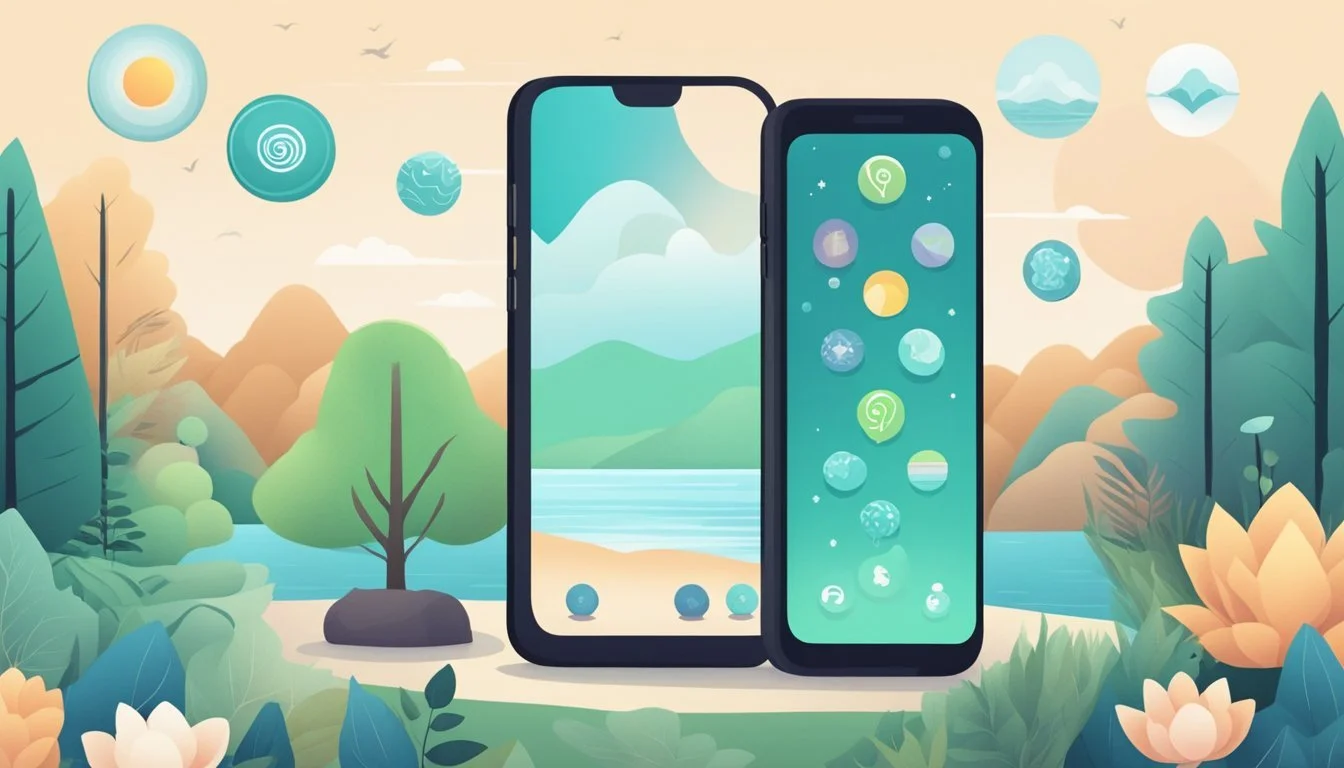Top Mindfulness Apps for Effective Anxiety Management
Anxiety affects millions of people worldwide, impacting daily life and overall well-being. As technology advances, innovative solutions have emerged to help individuals manage their anxiety symptoms effectively. Mindfulness apps have gained popularity as accessible tools for anxiety relief.
These specialized apps offer a range of features designed to reduce stress, promote relaxation, and improve mental health. From guided meditations to breathing exercises and mood tracking, mindfulness apps provide users with convenient ways to incorporate anxiety-management techniques into their daily routines. By exploring some of the top mindfulness apps available, individuals can find effective digital companions on their journey towards better mental health and reduced anxiety.
1) Headspace
Headspace is a popular mindfulness and meditation app designed to help users manage anxiety and stress. The app offers a wide range of guided meditations and mindfulness exercises tailored specifically for anxiety relief.
Users can access various meditation techniques to calm their minds and reduce anxiety symptoms. Headspace provides breathing exercises and relaxation tools to help individuals cope with difficult moments in their daily lives.
The app features soothing sounds and calming music to create a peaceful atmosphere for meditation and sleep. Headspace's guided sessions are led by experienced instructors who teach users how to cultivate mindfulness and awareness.
With regular use, Headspace aims to help individuals build resilience against stress and develop healthier mental habits. The app offers a free trial period, allowing users to explore its features before committing to a subscription.
Headspace's interface is user-friendly, making it accessible for both beginners and experienced meditators. The app's content is regularly updated to provide fresh material and keep users engaged in their mindfulness practice.
2) Calm
Calm stands out as a leading meditation and sleep app designed to reduce anxiety and stress. It offers a wide range of programs tailored to address specific concerns like work stress, acute anxiety, and negative thoughts.
The app provides guided meditation sessions that can fit into busy schedules, making it easier for users to incorporate mindfulness into their daily routines. Calm's library includes various breathing exercises and relaxation techniques.
Users can access content created by clinical experts and mindfulness teachers, ensuring a high-quality experience. The app caters to both beginners and experienced meditators, offering options suitable for different skill levels.
Calm places a strong emphasis on improving sleep quality, which is often closely linked to anxiety levels. It features sleep stories, soothing music, and nature sounds to help users unwind and prepare for restful sleep.
The app's user-friendly interface allows for easy navigation and customization. Users can track their progress and set personal goals, encouraging consistent practice and long-term benefits for anxiety management.
3) Pacifica
Pacifica is a mobile and web-based application designed to help users manage stress, anxiety, and depression. The app utilizes evidence-based practices such as cognitive behavioral therapy (CBT), mindfulness meditation, and relaxation techniques.
Users can track their mood and health through the app's built-in tools. This feature allows individuals to monitor their progress and identify patterns in their mental well-being over time.
Pacifica offers guided meditations to promote relaxation and mindfulness. These exercises can be particularly helpful for users experiencing anxiety or stress in their daily lives.
The app incorporates CBT-based journaling exercises, which encourage users to challenge negative thought patterns and develop more balanced perspectives. This cognitive restructuring approach is a key component of anxiety management.
Pacifica provides goal-setting features to help users work towards improving their mental health. By tracking daily use and goal achievement, individuals can stay motivated and engaged in their wellness journey.
The app's user-friendly interface makes it accessible for people seeking anxiety relief. Its combination of various therapeutic approaches offers a comprehensive toolkit for managing mental health concerns.
4) Anxiety Relief Hypnosis
Anxiety Relief Hypnosis is a mobile application designed to help users manage anxiety through hypnotherapy techniques. The app combines hypnotherapy with guided meditations to promote relaxation and reduce stress.
Users can access a variety of hypnotherapy sessions tailored specifically for anxiety relief. These sessions aim to address different aspects of anxiety, including general worry, social anxiety, and panic attacks.
The app offers a free trial period, allowing users to explore its features before committing to a subscription. It provides both default settings and customizable options to suit individual preferences.
Anxiety Relief Hypnosis may also benefit individuals dealing with related issues such as anger management, OCD, and PTSD. The app's hypnotherapy sessions are designed to be listened to regularly, potentially leading to improved anxiety management over time.
While hypnotherapy can be an effective tool for some individuals, results may vary. Users are encouraged to consult with mental health professionals for personalized treatment plans when dealing with severe anxiety or related conditions.
5) Insight Timer
Insight Timer stands out as a popular meditation app with a vast library of free guided meditations. The app offers content from a diverse range of teachers and traditions, allowing users to explore different approaches to anxiety relief.
Users can easily filter meditations by length, topic, or instructor to find sessions tailored to their specific needs. This flexibility makes it particularly useful for those seeking anxiety-focused practices.
Insight Timer's community features set it apart from other meditation apps. Users can connect with others, join groups, and participate in live events, fostering a sense of support and shared experience.
The app includes a customizable meditation timer, enabling users to create their own silent meditations with interval bells and ambient sounds. This feature can be especially helpful for those who prefer unguided practice.
Insight Timer also offers courses and longer programs for users looking to deepen their meditation practice and develop more comprehensive anxiety management strategies. Many of these resources are available at no cost, making the app accessible to a wide range of users.
6) MyLife Meditation
MyLife Meditation, formerly known as Stop, Breathe & Think, offers personalized meditation recommendations based on users' emotional states. The app asks users to check in with their current feelings and then suggests appropriate mindfulness exercises.
MyLife features a wide variety of guided meditations, including those specifically designed to address anxiety and stress. Users can choose from short sessions lasting just a few minutes to longer, more in-depth practices.
The app includes breathing exercises, yoga videos, and acupressure tutorials alongside traditional meditation practices. This diverse approach allows users to find techniques that resonate with their individual needs and preferences.
MyLife's tracking features enable users to monitor their emotional progress over time. This functionality can help individuals identify patterns in their anxiety levels and gauge the effectiveness of their meditation practice.
The app offers both free and premium content. While the free version provides access to a selection of meditations, the paid subscription unlocks the full library of exercises and additional features.
7) Sanity & Self
Sanity & Self is a mindfulness app tailored for those seeking anxiety relief and personal growth. The app offers expert-guided support to help users navigate emotional challenges and build resilience.
One of the app's key features is its focus on heartbreak recovery. It provides tools and guidance to help users heal from relationship difficulties and cultivate self-love.
Sanity & Self emphasizes the importance of presence in daily life. The app includes mindfulness techniques and practices designed to help users relax, refocus, and feel more grounded in the present moment.
To combat feelings of overwhelm and anxiety, Sanity & Self offers daily rituals. These structured practices aim to help users recharge and regain control over their day-to-day experiences.
The app recognizes that consistent practice is crucial for managing anxiety. It encourages users to incorporate mindfulness techniques into their daily routines, fostering a sense of calm and stability over time.
Sanity & Self's approach combines expert advice with practical tools, making it a comprehensive resource for those looking to address anxiety through mindfulness and self-care practices.
Understanding Mindfulness and Anxiety
Mindfulness practices offer powerful tools for managing anxiety symptoms. Research has demonstrated the effectiveness of mindfulness techniques in reducing anxiety and improving overall mental well-being.
How Mindfulness Alleviates Anxiety
Mindfulness helps individuals become aware of their thoughts and feelings without judgment. This awareness allows people to observe anxious thoughts rather than becoming caught up in them.
By focusing on the present moment, mindfulness techniques can interrupt the cycle of worry and rumination that often fuels anxiety. Deep breathing exercises and body scans are common mindfulness practices that promote relaxation and reduce physical tension associated with anxiety.
Regular mindfulness practice can also increase emotional regulation skills. This enables individuals to respond to stressful situations more calmly and rationally, rather than reacting with heightened anxiety.
Scientific Research Supporting Mindfulness
Numerous studies have shown the positive effects of mindfulness on anxiety disorders. A meta-analysis published in the Journal of Consulting and Clinical Psychology found that mindfulness-based therapies were moderately effective for reducing anxiety symptoms.
Brain imaging studies have revealed that mindfulness meditation can decrease activity in the amygdala, the brain region associated with fear and emotional reactivity. This reduction in amygdala activity correlates with lower anxiety levels.
Research has also demonstrated that mindfulness practices can increase gray matter density in brain regions responsible for learning, memory, and emotion regulation. These structural changes may contribute to the long-term benefits of mindfulness for anxiety management.
Key Features of Effective Mindfulness Apps
Effective mindfulness apps incorporate several essential elements to support users in managing anxiety. These features work together to create a comprehensive and user-friendly experience.
User-Friendly Interface
A clean, intuitive interface is crucial for mindfulness apps. Easy navigation allows users to quickly find meditation sessions, breathing exercises, and other tools. Clear icons and minimal clutter reduce cognitive load, keeping the focus on relaxation.
Apps often use calming color schemes and soothing visuals to create a tranquil atmosphere. Customizable themes let users personalize their experience. Simple onboarding processes guide new users through app features, ensuring a smooth start to their mindfulness journey.
Accessibility options, such as adjustable text size and screen reader compatibility, make the app usable for a wider range of people.
Guided Meditations
High-quality guided meditations form the core of effective mindfulness apps. Professional instructors with expertise in meditation and anxiety relief lead these sessions. Apps offer a variety of meditation styles, including body scans, loving-kindness practices, and mindful breathing exercises.
Sessions range from quick 5-minute exercises to longer, in-depth meditations. This variety caters to different schedules and experience levels. Many apps provide themed collections targeting specific concerns like sleep issues, work stress, or relationship anxiety.
Background sounds and music options enhance the meditation experience. Users can often choose from nature sounds, ambient music, or silence to suit their preferences.
Progress Tracking
Robust progress tracking features help users stay motivated and gauge the impact of their mindfulness practice. Apps typically include daily streaks, meditation minutes logged, and session completion rates. Visual representations like graphs or charts make it easy to see improvements over time.
Some apps offer mood tracking, allowing users to record their emotional state before and after meditation sessions. This data helps identify patterns and the effectiveness of specific practices. Reminder systems encourage consistent practice, with customizable notifications.
Many apps integrate with health platforms like Apple Health or Google Fit, providing a more comprehensive view of overall well-being. Achievements and milestones celebrate user progress, reinforcing positive habits.
Tips for Maximizing the Benefits of Mindfulness Apps
Effectively utilizing mindfulness apps requires a strategic approach. By implementing specific techniques and habits, users can significantly enhance their anxiety relief experience.
Consistency in Practice
Establish a daily routine for using the mindfulness app. Choose a specific time each day, such as morning or evening, to engage with the app. Start with shorter sessions, gradually increasing duration as comfort grows.
Set reminders on your phone to prompt regular use. Many apps offer built-in notification features to help maintain consistency.
Track your progress within the app. Most mindfulness applications provide tools to monitor session frequency and duration. This data can motivate continued use and highlight improvements over time.
Combining With Other Anxiety Management Techniques
Integrate app-guided mindfulness with physical relaxation methods. Deep breathing exercises or progressive muscle relaxation can complement meditation practices.
Incorporate mindful movement. Yoga or tai chi can enhance body awareness and complement app-based mindfulness exercises.
Use journaling in conjunction with app sessions. Writing down thoughts and feelings before or after meditation can provide additional insights and reinforce the benefits of mindfulness practice.
Setting Realistic Goals
Start with achievable targets. Begin by aiming for short, daily sessions rather than lengthy meditations.
Adjust goals based on personal schedule and lifestyle. Be flexible and modify practice times as needed to maintain consistency.
Focus on quality over quantity. A fully engaged 5-minute session can be more beneficial than a distracted 30-minute one.
Use app features to set and track goals. Many mindfulness apps offer goal-setting tools and progress tracking to help users stay motivated and accountable.




